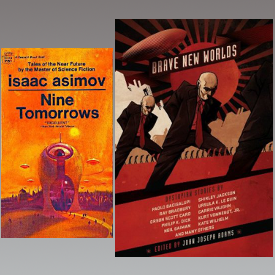 When I returned to reading science fiction as adult I discovered a whole new generation of authors:Greg Bear, David Brin, William Gibson, Octavia E. Butler, and Orson Scott Card. In each case I would read a recommended book and enjoy it so much I’d start seeking out others by them. As a movie critic I would later get excited when their works were adapted to the big screen although, sad to say, “Johnny Mnemonic” and “The Postman” were not classics.
When I returned to reading science fiction as adult I discovered a whole new generation of authors:Greg Bear, David Brin, William Gibson, Octavia E. Butler, and Orson Scott Card. In each case I would read a recommended book and enjoy it so much I’d start seeking out others by them. As a movie critic I would later get excited when their works were adapted to the big screen although, sad to say, “Johnny Mnemonic” and “The Postman” were not classics.
In November the movie version of Ender’s Game will reach the end of a long and torturous path through Hollywood. I am eagerly anticipating it and hoping they get it right, as Card’s novel is truly one of the modern classics of the genre. Of late I have become troubled by a move in some quarters to boycott the film.
The reason has nothing to do with the film or its content. It has to do with Card himself. (Card had nothing to do with the film except to cash the check he received for the movie rights. It is written and directed by Gavin Hood, whose credits include the 2005 “Tsotsi.”) I am opposed to the boycott as it will accomplish nothing and may hurt innocent people who may not even be aware of Card or his views.
For those coming in late, Card — a devout Mormon — is an out-spoken opponent of gay rights. He has not been shy about expressing his views in the strongest (some would say “ugliest”) terms. I completely disagree with him and am glad the tide of history is turning against him (as even he has started to grudgingly acknowledge).
However I am also a student of the Hollywood blacklist and am well aware of an equally ugly history where people could not get work or films could not get made because someone associated with it also had views deemed “wrong.” In the 1940s and 1950s anyone considered a Communist or a “Red sympathizer” or a “pinko” had to clear themselves before they could work in film or television (and many other areas of American life). This usually involved “naming names” of others of suspected views, and thus the cycle continued. No analogy is perfect, but it should be noted that as sincere as the people calling for a boycott of the film are about their opposition to Card’s anti-gay bigotry, the people who wanted to “cleanse” Hollywood of “Red influence” were equally sincere. Many of them truly believed that preventing a “Red” screenwriter from working was a victory over Stalin.
A few years ago Boskone, one of the longest running regional SF conventions, had Card as its guest of honor. A number of people felt they could not attend that year. They did something I greatly respected. They wrote a public letter (which was distributed at the con) acknowledging Card’s stature as an SF author and why it was not inappropriate for him to be invited to the convention, but also saying that his views made it impossible for them to participate. Note that they did not urge other people not to attend. They acted as their own consciences dictated and then used it as a teaching moment.
I had my own experience with Card at the convention. I was asked to do a Q&A session with him focusing on his misadventures in Hollywood up until that point. When we opened it up for questions a woman asked if the movie version of “Ender” would have more girls in the academy than there were in the book. Card could have said it wasn’t up to him. Instead he said he didn’t think so because women weren’t really fit for combat or fighting. I could feel the tension rising in the room as people were ready to argue he was wrong, perhaps by demonstrating it on his person. In one of my rare moments of truly inspired improvisation I said, “We’ll be holding off that discussion until later today when (Harvard President) Larry Summers will be explaining why women are no good at math and science.” Summer’s maladroit comment was then in the news and I got a huge laugh, defusing the anger and letting us move on. However I always remembered that it was Card who provoked the anger in the first place.
When it comes to gay rights (and women in the military for that matter) Card is wrong. Shamefully wrong. He pleads for “tolerance.” That is also wrong. I will absolutely defend his right to express his views, however hateful, but that does not mean we need to treat them as respectable or intelligent. For some those views will taint his works or, in this case, a movie derived from his work. That is an individual choice.
I will go see and review “Ender’s Game” and I’m hoping it’s a really good movie. I will pointedly criticize any attempt to stigmatize the film or organize boycotts against it because of the author of the source material. However if you, individually, feel you just can’t go, I will understand.










I find this whole article highly offensive. Card is not just voicing his opinion, he’s actively working to defeat marriage equality in every way possible. Doing so directly harms us gay folks in very tangible ways. This is not some abstract argument. This is where you need to take a side.
Holding this to an analogy with the Hollywood Blacklist of the 50s is utterly faulty. A better analogy is Rosa Parks and that Bus. But it’s clear you lack her courage.
If this were a different person than Card and a different film but the offensive topic was race instead of sexuality, you’d join the boycott. No problem. But, no it’s a SF film that you’re interested in. And that makes all the difference.
But since this boycott suggests that you sacrifice in the very smallest way, you come up with these outlandish reasons to brush off the boycott. Very shallow of you. You’re all for gay rights and marriage equality, just as long it demands nothing of you. That’s disgusting self-involved behavior.
You should be ashamed of yourself.
In fact it is your reply that is outlandish. Boycotting the movie will not harm Card in the slightest and will do nothing whatsoever to advance the cause of gay rights. A boycott would be entirely about being self-righteous. It would make you feel good and accomplish nothing else.
Your attempts to smear me are ludicrous and ill-informed. Such attitudes are as deplorable on the extreme left as they are on the extreme right, which is why I raised the specter of the Hollywood blacklist. The people supporting that were just as rabid as you are in insisting their cause was just and that anyone who dared to object must be sympathizing with the enemy.
There are many things you can do to support gay rights. Boycotting a movie because you don’t like the author of the source novel is not one of them. Are you planning on extending the boycott to all of Tor Books as well?
Hi, David
I am glad to see the joys of liberty and freedom finally reaching a group which has been denied basic inalienable freedoms. And, of course, laws are not the only aspect that needs to be addressed. We must be on guard against more subtle societal pressures. We must reject bullying, reject its subtle forms of intimidation, such as attempting to publicly shame those who differ in lifestyle or opinion, and reject attempts to intimidate people into silence.
Rationally and reasonably disagreeing with Daniel’s opinion on the boycott is perfectly acceptable. Attacking his person, impugning his honor, and attempting to publicly shame him is a form of intimidation. It is, in a word, bullying. It makes people fearful to voice an opinion. I realize this is a subject of heated concern, and I understand your reaction. I am not immune to making inappropriate responses when my passions are aroused, but I still disagree with the method chosen to engage in the conversation. We stand a much better chance of reducing verbal intimidation if we do not use it in our responses. And I think it is a noble thing to use self-restraint to help end what is a self-feeding cycle of unproductive discourse.
I agree, David. Daniel’s article/blog entry was the cant of the apologist. Card has been publicly and vocally hostile to gays and lesbians and has called for the overthrow of our government if it allows gay marriage. Now that it does, he says that the issue is now moot. Well, no it is not. This is a lot more serious than Card’s sycophants think. To me, he’s the Rush Limbaugh of science fiction and deserves censure. What he’s said is just plain offensive. That cannot stand.
I repeat without fear of contradiction: boycotting the film will NOT harm Card, it WILL harm innocent people, and it will do NOTHING to advance the cause of gay rights and gay marriage. It is a futile gesture that may make you feel good for a moment but will otherwise accomplish nothing.
BTW, producers Lionsgate Films has announced their full support of gay rights, has long provided benefits for their gay employees, and will be holding a benefit for a gay rights group with the opening of the film. And, they correctly note, the movie has nothing at all to do with the subject.
So, no, no “apologies” for Card’s bigotry here. Just a statement against empty gestures accomplishing nothing.
I plan on missing Ender’s Game. I read an early version of the original novella (novelette?) many years ago, and I should start by apologizing if my memory isn’t exactly perfect. I’ve never felt any need to go back and reread it. I found the moral premise disturbing — the idea that children (well, extremely young adults, anyway) were being trained to fight a war by dressing it up like some sort of giant video game, and claiming that their reaction time and eye-hand coordination was so much better than adults’ that it offered a tactical advantage. I was more offended when (if I recall correctly) the hero, Ender, decides to rewrite the rules of the game, thinking “outside the box”, and solves the problem by sacrificing a huge number of civilians in order to trap and destroy the enemy.
Please, please. I understand that in war, sometimes hard choices have to be made. I still found it very unsettling that Card chose to make his hero, a young boy, the one who “wins” by having made this choice.
I also think it ties into Card’s personal moral platform. I’ve been to his website, and I’ve seen political positions he’s taken on issues other than gay rights. This is a man whose ethics are expressed much more by what he attacks than by what he supports. I find Card to be a despicable and unprincipled excuse for a human being, and my memory of that early version of Ender’s Game does nothing to contradict this.
I’ll admit once again that I’m working from an old memory of an early version of the story. Nonetheless, I don’t approve of turning young children into weapons while their minds are still forming what will become the moral principles they’ll have as adults. I can’t separate Card the writer from this central point of his story.